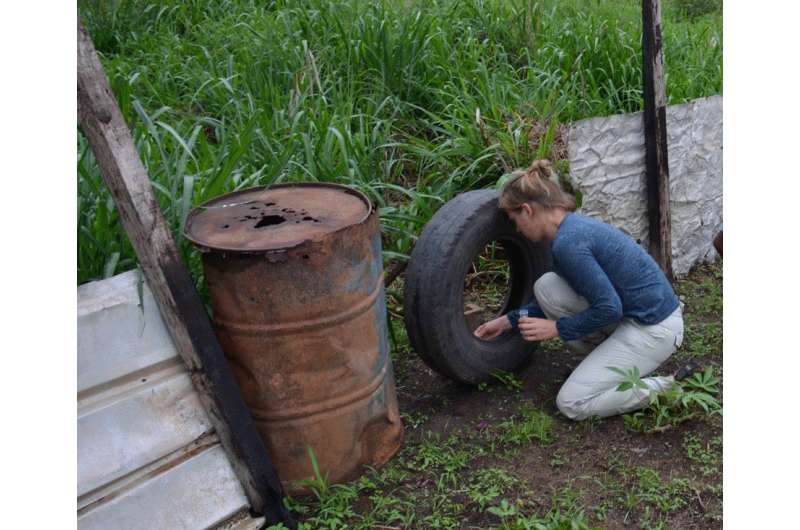Gut microbiota of larvae has an impact on mosquito's ability to transmit human pathogens

Researchers have demonstrated that differential bacterial exposure during the development of mosquito larvae (Aedes aegypti) can influence adult traits related to the transmission of arboviruses. This study represents an important step toward a more comprehensive understanding of how the environment shapes the risk of vector-borne disease.
Mosquitoes are holometabolous insects (i.e. organisms that go through a complete metamorphosis). As such, they occupy two main habitats during their life cycle. The larval stage develops in water and the adult stage lives on land. The adult traits of mosquitoes (e.g. body size, lifespan, susceptibility to human pathogens) depend on environmental conditions experienced both during larval development and during adult life.
Recently, the scientific community has realized that the adult mosquito gut microbiota (the microbial environment in the gut of the mosquito) contributes to modulate the transmission of mosquito-borne pathogens. However, the role of the microbiota of larvae in influencing adult traits is under-explored.
This question is particularly important for Aedes aegypti, a major vector of arboviruses such as dengue, yellow fever, Zika and chikungunya viruses. In sub-Saharan Africa, Ae. aegypti exists in an urban form and a forest form, and the larval breeding sites differ between the two. Whereas the urban form develops in man-made containers such as used tires and discarded items, the forest form develops in natural breeding sites such as rock pools and tree holes.
Researchers from the Institut Pasteur and CNRS, in collaboration with scientific teams from IRD, University Claude Bernard Lyon 1 and CIRMF in Gabon, observed differences in the gut microbiota of Ae. aegypti larvae between the forest and urban environments. In the lab, they demonstrated that differential bacterial exposure during the development of Ae. aegypti larvae can have carry-over effects on adult traits related to the transmission of arboviruses. Thus, exposure to different bacteria during development results in variation in the speed at which larvae develop, the size of adult mosquitoes, immune activity of adults, as well as susceptibility to dengue virus.
Laura Dickson, first author of the study and researcher at the Institut Pasteur, says, "This discovery is highly significant because it provides the first empirical proof of principle that bacteria in the aquatic environment can modulate the ability of adult mosquitoes to transmit human pathogens."
Louis Lambrechts, researcher at CNRS, says, "our discovery calls for an increased appreciation of the role of larval ecology in the transmission of mosquito-borne pathogens."
These findings represent an important first step toward a more comprehensive understanding of how the environment shapes the risk of vector-borne disease. Improved knowledge on the bacteria found in natural larval breeding sites and their consequence at the adult stage could lead to new disease control strategies. For instance, this could be done by targeting the breeding sites where mosquito larvae are most likely to become efficient vectors of arboviruses. An alternative could be to directly manipulate the bacteria in breeding sites to reduce the ability of mosquitoes emerging from these sites to transmit human pathogens.
More information: Laura B. Dickson et al, Carryover effects of larval exposure to different environmental bacteria drive adult trait variation in a mosquito vector, Science Advances (2017). DOI: 10.1126/sciadv.1700585
Journal information: Science Advances
Provided by Institut Pasteur



















